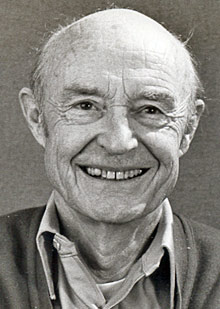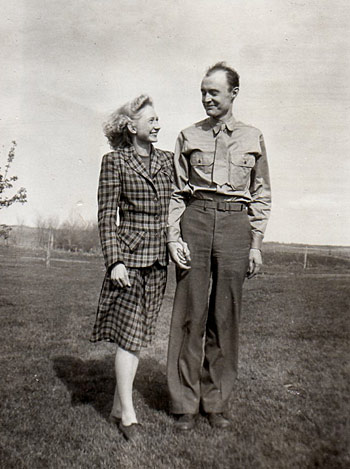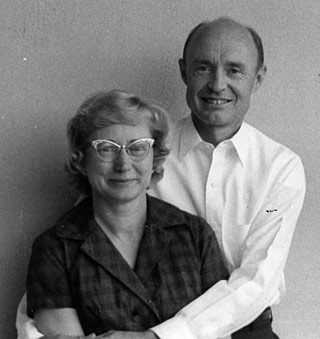Kermit Wiltse, grassroots scholar of social work, has died at 94
| 08 July 2009
BERKELEY — Kermit T. Wiltse, a professor emeritus of social welfare at the University of California, Berkeley, and a North Dakota farm boy who devoted his life to improving the lot of disadvantaged children, died at his home in Berkeley on June 19 at age 94.
 Kermit Wiltse
Kermit Wiltse
From This Valley: In memory of Kermit and Jane Wiltse
During his more than three decades on the UC Berkeley faculty, Kermit Wiltse published numerous papers on child welfare, foster care and welfare programs such as Aid to Families with Dependent Children, helped by his insights as a grassroots social worker.
"He felt strongly about the need to apply research to impact persistent social problems for the public good," said Lorraine Midanik, dean of UC Berkeley's School of Social Welfare. "He will be missed by all his colleagues and friends."
The youngest of 10 children, Wiltse was born on May 24, 1915, on a farm in Lisbon, North Dakota. He was raised in a small two-story house where the kids slept three or four to a bed. He walked several miles to get to school each day and was among a handful of his school mates to make it to college, according to an autobiography he wrote earlier this decade.
Wiltse paid his way at the University of North Dakota by working for the National Youth Administration, a Depression-era program to help young people get a college education, and received a bachelor's of arts degree in 1937, graduating Phi Beta Kappa. Growing up poor and understanding the needs of disadvantaged youths, he was drawn to a career in social work.
"He came of age in the Great Depression and relieving the hardship of those years always defined for him the moral framework for the development of social work and social welfare," said James Leiby, a professor emeritus of social welfare and friend and colleague of Wiltse's.
With just two quarters of his graduate work completed at the University of Minnesota, Wiltse left college to become a child welfare worker on a Sioux Indian reservation, according to his autobiography.
Although "stressful and frustrating," he wrote, the job on the Sioux reservation taught him lessons in understanding a very different culture that served him throughout his life.
 Jane and Kermit Wiltse in 1942.
Jane and Kermit Wiltse in 1942.Upon earning a master's degree in social work from the University of Chicago in 1940, Kermit Wiltse returned to North Dakota and got a job as a case manager. Shortly thereafter, he was drafted into the U.S. Army to fight in World War II. As he was about to be shipped to France, he heard Rosemary Clooney on the radio sing "I Don't Want to Walk Alone." It was then that he proposed to Jane. They married on March 25, 1942.
After four years in the Army, Wiltse returned to the University of North Dakota to teach sociology and social work. By then, he and Jane had two sons, Stephen and Paul. Wiltse enrolled in the University of Pittsburgh on the GI bill and earned a Ph.D. in social welfare. In 1950, he was recruited to the faculty of UC Berkeley's School of Social Welfare and drove West with his family. The Wiltses bought a small house in the hills above Walnut Creek and had a third son, Eric. Later, they moved to a house in Berkeley within walking distance of the campus.
At the time, UC Berkeley's social welfare program was transitioning from one focused on training social workers to one that "steered students toward teaching and research," Wiltse wrote. Although he welcomed the scholarly approach, at times these dual goals presented a tension for him as he sought to combine practice with research and publication.
His first publication while at UC Berkeley was "Social Casework in Public Assistance," a 32-page pamphlet published by the California State Department of Social Welfare. He went on to publish many articles, pamphlets, conference papers and co-authored books. His main topics were public assistance, social work in the schools and child welfare, as well as social policy and administration.
His 1978 book, "Children in Foster Homes: Achieving Continuity of Care," described one of the still few experimental studies in child welfare, exploring the effectiveness of a systematic case management procedure in increasing continuity of care for children, said Eileen Gambrill, a UC Berkeley professor of social welfare and his former colleague.
"Kermit had an abiding and deep concern for the welfare of children and families," Gambrill said. "His passion encouraged others, including myself, to devote attention to this area. He touched the lives of many in many venues, including both faculty and students."
Wiltse served as associate dean of social welfare from 1965 to 1971. Among other accolades, he won the San Francisco Foundation's Koshland Award in 1961; the Social Worker of the Year award in 1987 from the California Association of Social Workers; and the University of North Dakota's Alumni Achievement Award in 1995. He also traveled to Italy on a Fulbright scholarship in 1965.
During his career, he observed a trend toward private practices of social work that, he wrote, drew many social workers away from social agencies. And this troubled him as he saw himself as an "old-fashioned social worker who felt the hurly burly of daily social agency practice was the place where real social work occurred," according to his autobiography.
 The Wiltses together in 1965, when he was serving as associate dean of social welfare at UC Berkeley.
The Wiltses together in 1965, when he was serving as associate dean of social welfare at UC Berkeley.Not long after their 60th wedding anniversary, Jane had a series of strokes, and her health began to deteriorate. Kermit Wiltse cared for her, refusing to send her to a nursing home. On June 18, Jane died shortly after noon. "Later Kermit was heard to say, almost to himself, "Now I can go," wrote Stephen Wiltse.
In addition to Stephen Wiltse of Fort Bragg, Calif., Kermit and Jane Wiltse are survived by their sons Eric Wiltse of Berkeley; Paul Wiltse of Roseville, Minn.; and grandchildren Kevin, Michael and Ben.
Kermit and Jane Wiltse's ashes will be interred together at Sunset Cemetery, El Cerrito, Calif. A celebration of their lives will be held on July 19 at 11:15 a.m. at the Lutheran Church of the Cross, 1744 University Ave., Berkeley. In lieu of flowers, the family asks that contributions be made to the Memorial and Tribute fund of the National Association of Social Workers Foundation at 750 First Street, NE, Suite 700, Washington, DC 20002-4241.

